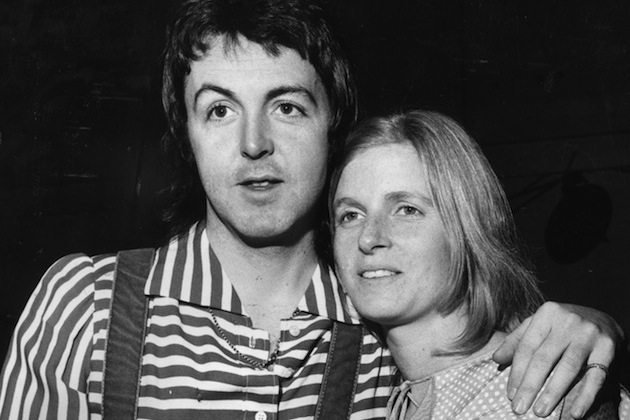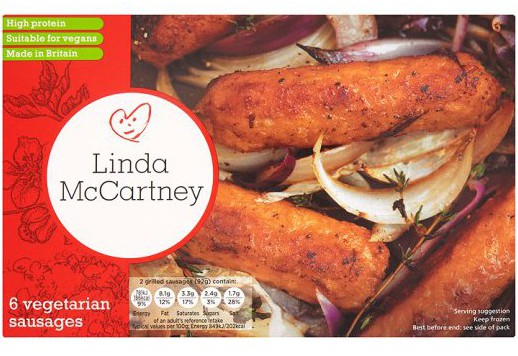There is no such thing as magical food. Vegetarian breast cancer victim Linda McCartney is a case in point for this sort of junk science.

The reported result — a claimed 21% decline in mortality — is small and statistically meaningless. More importantly, even if it was true, it is a population statistic that is meaningless to individuals. See e.g., vegetarian breast cancer casualty Linda McCartney.
Then there’s this admission from the researchers:
… it remains unknown whether isoflavone consumption should be encouraged or avoided for breast cancer patients.
Soy sausages certainly didn’t seem to help Linda McCartney.

The media release is below.
###
Soy food consumption linked to prolonged survival in some breast cancer patients
WILEY
New research indicates that dietary soy products are safe and even beneficial for women diagnosed with breast cancer. Published early online in CANCER, a peer-reviewed journal of the American Cancer Society, the findings may help resolve controversies over soy’s potential link to breast cancer outcomes.
Soy foods are considered among the healthiest for human consumption, but their estrogen-like properties have raised concerns of a potential increased risk of breast cancer. This is because in hormone receptor-positive cancer, the most common form of the disease, there are some concerns that high estrogen levels help cancer cells grow and spread, though this remains controversial.
“Isoflavones–the component of soy that has estrogen-like properties–have been shown to slow the growth of breast cancer cells in laboratory studies, and epidemiological analyses in East Asian women with breast cancer found links between higher isoflavone intake and reduced mortality; however, other research has suggested that the estrogen-like effects of isoflavones may reduce the effectiveness of hormone therapies used to treat breast cancer,” explained Fang Fang Zhang, MD, PhD, of the Friedman School of Nutrition Science and Policy at Tufts University. “Because of this disparity, it remains unknown whether isoflavone consumption should be encouraged or avoided for breast cancer patients.”
To provide some clarity, Dr. Zhang and her colleagues looked at the relationship between dietary intake of isoflavones and death from any cause in 6235 American and Canadian women diagnosed with breast cancer. Over a median follow-up of nine years, women with breast cancer who consumed high amounts of isoflavones had a 21 percent lower risk of dying than women who consumed low amounts. This decrease was largely confined to women with hormone receptor-negative tumors and women who were not treated with anti-estrogen therapy such as tamoxifen (which blocks the effects of estrogen). In contrast to some previous research, high levels of isoflavone intake were not associated with greater mortality among women receiving hormonal therapy.
“Based on our results, we do not see a detrimental effect of soy food intake among women who were treated with endocrine therapy,” said Dr. Zhang. “For women with hormone receptor-negative breast cancer, soy food products may potentially have a protective effect. Women who did not receive endocrine therapy as a treatment for their breast cancer had a weaker, but still statistically significant, association.”
More than 20 percent of all new breast cancer cases with known estrogen and progesterone receptor status are receptor-negative, and they have poorer survival rates than hormone receptor-positive cases. “Whether lifestyle factors can improve survival after diagnosis is an important question for women diagnosed with this more aggressive type of breast cancer. Our findings suggest that survival may be better in patients with a higher consumption of isoflavones,” said senior author Esther John, PhD, of the Cancer Prevention Institute of California. The investigators noted that they examined only naturally occurring dietary isoflavones, not isoflavones from supplements.
How isoflavones from foods interact with breast cancer cells is unclear, but research has shown that they have antioxidant, anti-inflammatory, anti-angiogenic, and other effects that could influence tumor survival and growth.
In an accompanying editorial, Omer Kucuk, MD, of the Winship Cancer Institute of Emory University, noted that the United States is the number 1 soy producer in the world and is in a great position to initiate changes in health policy encouraging soy intake. “We now have evidence that soy foods not only prevent breast cancer but also benefit women who have breast cancer. Therefore, we can recommend women to consume soy foods because of soy’s many health benefits,” he wrote.
###
Meanwhile the great denial of the probable cause of endemic breast cancer remains hidden from the public. To all intents and purposes either the FDA regulations regarding the amount of Iodine in western diets is deliberately low for obvious nefarious reasons or someone made a cock-up and got the decimal point in the wrong place.
http://archive.lewrockwell.com/miller/miller20.html
We are back to the pea under the thimble numbers games. They quote 6235 women diagnosed with breast cancer, but then refer to a number of different potential classes (“treated with endocrine therapy”, “hormone receptor negative” and others) which implies that the total number was broken down into quite a few classes of cancer and/or treatment. Added to this, they considered all-cause mortality (not just deaths from breast cancer) and linked it to “consumption of soy-based foods”, presumably by a questionnaire of remembered food intake over the period of the study.
And they they state “21% lower risk of dying” – but don’t say what from, or what amount of soy – and they specifically say that thy can’t link it to isoflavones (the supposed “healthy” bit of the soy products). How many classes were the 6235 women split up into? How many actual created the “21%”? How many different classifications did they try before they “found” this result?
An exercise in statistical jiggery-pockery to come up with a headline in support of a pre-existing premise – that soy is not bad for you. Did they declare any financial interest from the soy-industry?